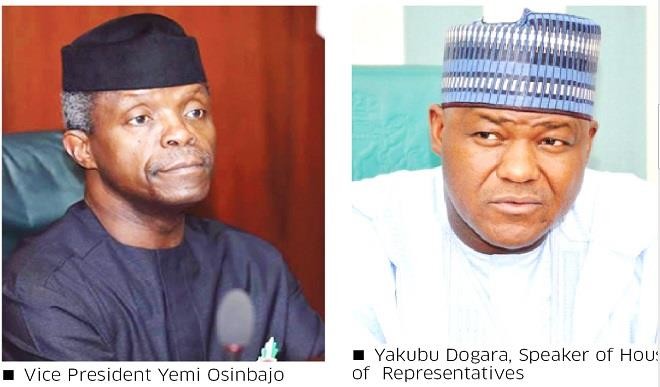Hate speech: To be combated with existing or new law?
There have been debates on whether the move to penalize hate speech in the country could be enforced with existing laws or a brand new law through the National Assembly. Following his national broadcast, President Muhammadu Buhari stated that the discussions on social media in his absence crossed the red line and left him distressed. […]


There have been debates on whether the move to penalize hate speech in the country could be enforced with existing laws or a brand new law through the National Assembly.
Following his national broadcast, President Muhammadu Buhari stated that the discussions on social media in his absence crossed the red line and left him distressed. He therefore ordered security agencies to scale up their operations to deal with hate speech and activities capable of causing disunity in the country.
Earlier, Vice President Yemi Osinbajo on August 17 described hate speech as a kind of terrorism under the provisions of the Terrorism Act, 2011 because it employed violence and intimidation to achieve political objectives.
While addressing the National Economic Council (NEC) at the Presidential Villa, Abuja, Osinbajo said the government hoped to deal with hate speech to ensure peace and security in the country.
“Hate speech and promotion of the same throughout history, from Nazi Germany, to the extermination of Jews, to the Rwandan genocide, succeeded in achieving their barbarous ends by the silence of influential voices from the aggressor communities,” he said.
As a result, the Director of Defence Information, Major-General John Enenche, announced that the military has begun monitoring social media posts to identify those that undermine the country’s security.
“We tackle them appropriately with appropriate responses. Ahead of that, we are also proactive. We have measures in place, scientific measures to be able to sieve this information and also to get to the public and let them know that some of this information they are getting is not genuine; are not true and their objective is an anti-corporate existence of this country,” he said.
However, lawyers have reacted differently to the Federal Government’s position and how to realize it.
Reacting, Niyi Akintola (SAN) said hate speech, which is an act of incitement, is captured under the Criminal Code, adding that what has been lacking was the political will to implement the law.
“Our problem in Nigeria is not lack of the necessary legislation but it is the will. If hate speech is being treated as an act of terrorism I think the then Acting President is right,” he said.
Speaking in the same vein, constitutional lawyer and author, Sebastine Hon (SAN) said the then Acting President is “absolutely correct” in his classification of hate speech as terrorism and asked him to bring the full weight of the law to bear on offenders and sponsors as provided in Section 4 of the Terrorism Prevention Act, 2011.
“There can be no better description of the current situation in Nigeria, where ethnic or cultural groups are issuing, and willy-nilly organised and unguarded threats to other ethnic groups in Nigeria.
“Section 1(2) of the Terrorism Act, 2011, which described terrorism as an “act deliberately done with malice, which, amongst other things, is intended or can reasonably be regarded as having been intended to seriously intimidate a population or seriously destabilise or destroy the fundamental political, constitutional, economic or social structures of a country or an international organization,” he said.
“I personally must commend the Acting President for this timely proclamation, which only confirms and I daresay addresses my public statement a few days ago that the Federal Government must act fast to arrest our apparent, if not clear, descent to total anarchy, due to the avalanche of hate speeches flying over the whole place,” he added.
Also speaking, Lagos-based commercial lawyer, Etigwe Uwa (SAN) said hate speech can also be punished through the provisions of Cybercrime Act.
On his part, the chairman of the Nigerian Bar Association (NBA), Ezenwa Anumnu, said the existing laws are sufficient to deal with hate speech. He however added that the country also needs to strengthen the existing institutions and courts, and not necessarily create new law to handle the issue.
However, Lagos-based civil liberties lawyer, Olisa Agbakoba (SAN) pointed out that there is no specific legislation against hate speech, adding that if no specific law was enacted to tackle the offence, it would suffer in the law courts by objections that there is no such law.
“Section 38 (12) of the constitution makes it very clear that every offence must be defined. Hate speech is not defined. Hate speeches are intended to incite or when you use vulgar speech,” he said.
“When you look at issues being traded now in Nigeria between Nnamdi Kanu’s people and the Arewa Youths, I had once said that the so-called hate speech by the Arewa Youth Movement is politically incorrect but legally permissible. There is no law that says somebody cannot use hate speech. My point is if you want to tackle hate speech you have to have specific law for that,” he added.
In the same vein, human rights lawyer, Hamid Ajibola Jimoh stated that based on Section 36 (8) and 12 of the 1999 Constitution, ‘hate speech’ “shall not be regarded an offence in Nigeria or any part thereof except there is a law to that effect.”
He added that ‘hate speech’ can only be regarded as an offence of terrorism under Section 1(1) to 40 of the Terrorism Prevention Act only in the FCT, but will be difficult to criminalise throughout the country as a federal offence.
He therefore called for legislation by the various states Houses of Assembly, adding that “Criminalizing ‘hate speech’ is within the Residual Legislative List.”
